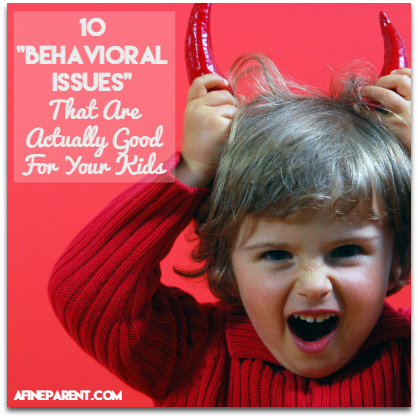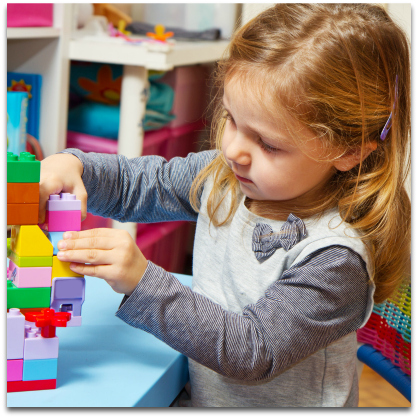 Kids are cute. But boy, can they press our buttons.
Kids are cute. But boy, can they press our buttons.
Aren’t you sometimes awed by how easily your little angels can push you to the edge?
I know I am!
51% of my time as a parent is filled with joy. The other 49% is spent managing my own internal turmoil from interacting with a growing, curious being learning her way to function in the world with nary a trace of concern for the havoc she wreaks in me.
So, it is with a smile on my face (and the mantra “this too shall pass” playing in a loop in my head) that I present to you this list of “behavioral issues” in children that have driven me mad as a mother and an ex-teacher… but I am learning to cope with, because of how instrumental they are in helping a child learn, grow and develop.
#1 Throwing Tantrums
“I want sweets now.”
I’m in the middle of cooking dinner. I’ve had a busy day. I’m tired. My spider senses are starting to tingle with the premonition that I’m going to be part of a train wreck. I muster up the last of my calm control and respond, “In this family, we only have sweets after dinner.”
The incessant demand for sweets soon turns to screaming that has me boiling like the soup I was brewing for the family.
Why do they behave like this?
Tantrums come from feelings of anger and sadness both intertwined and indicates immaturity of the pre-frontal cortex that regulates emotions and social behavior. This immaturity has been inferred to play a role in helping a child learn language much faster than adults.
What is good about this?
This indicates the child has freedom of feeling greater than the judgement that some feelings are bad. In some children, it may also be an indication of deep emotions and thus potential passion.
Suggested Action
Nurture language and emotional regulation skills by stating their emotions and how the parent plans to respond. For example, “You are feeling angry and sad now. I will come and give you a hug as soon as I can take my hands off the soup on the stove.” Then ignore the tantrum until the child has fully expressed her anger. DO NOT QUESTION them when there’s still anger. Their brains are not ready to process information when extremely agitated. After their anger is spent and there’s only sadness, comfort them.
#2 Being Easily Distracted
 This refers to the child who constantly fidgets, who can’t sit still and is easily distracted by the slightest sound or movement.
This refers to the child who constantly fidgets, who can’t sit still and is easily distracted by the slightest sound or movement.
Why do they behave like this?
This indicates “more brains” – more left superior parietal lobe matter of the brain. As we age, pathways within our brain are trimmed for efficiency which also reduces distractibility.
What is good about this?
Superior parietal lobe has been linked to writing, is used in spatial orientation, and receives a great deal of visual input as well as sensory input from one’s hand awareness.
Suggested Action
Keep their hands busy while they learn. Most intuitively, keep their hands busy with a related activity. For example, when encouraging them to read independently, we can suggest for them to hold the book independently, to point to each word they are decoding and turn the page themselves after they are done with that.
A homeschool teacher had also successfully gotten fidgety children to learn by playing unrelated games (e.g., throwing foam balls to and fro with her student) while assessing them on addition or letting a student play with Mr Potato Head while going through the Slope Formula. The underlying principle is to help them discover the best conditions for their personal learning and performance.
#3 Not Finishing Tasks
It is important to distinguish whether the child “gives up” on activities in general or only in selected activities. For example, my daughter is able to work her way through a 20-piece jigsaw puzzle by herself but does not complete coloring activities.
Why do they behave like this and what is good about this?
If they’re just abandoning some of the activities, it is an indication of our children’s gifts and inclinations – activities in which they persevere less in are those which they are more bored with. We should try to enrich their environments more with the activities they love.
Suggested Action
However, if lacking perseverance is habitual or showing in high-stake areas, one thing to look at is to relate “boring” topics with their interests. For example, “I wonder how fast that rugby player runs to outrun his opponents. Shall we find out?” is one way to relate speed, a concept in Maths with the subject of rugby so that they are kept motivated.
To help them develop strategies in self-regulation so they can persevere, help them break down a difficult task into contiguous milestones. For example, my student’s complaint that “Algebraic Fractions” is too hard has us breaking it down into the pre-requisite concepts of “Fractions” and “Quadratic Equations”. After revisiting the foundations, “Algebraic Fractions” become a lot easier to tackle.
#4 Making Rash Choices
 Has your heart ever leapt out of your mouth when you see your child dashing to the road? Or know of them experimenting with their lifestyles in ways that made you cringe?
Has your heart ever leapt out of your mouth when you see your child dashing to the road? Or know of them experimenting with their lifestyles in ways that made you cringe?
Why do they behave like this?
Their frontal lobe (which helps in assessing risks) is not as connected to the rest of the brain compared to adults.
What is good about this?
They are maximising opportunities to push the envelope and tread paths that had not been explored before. This is a sign of innovation and courage.
Suggested Action
Younger children can be physically restrained in situations that can lead to disastrous consequences (e.g., playing with electrical sockets.) For parents of older children, work with them on why these decisions feel good to them. Can the joy be replicated in a safer situation (e.g., getting proper instructions in driving race cars in a driving school rather than racing on public roads)?
#5 Being Straight Shooting
Do I see other raised hands of parents who have ever been mortified by what your children said in public? For me, I remember wanting to hide when I overheard my daughter proclaiming loudly once that I had dug my nose before leaving my home that morning.
Why do they behave like this?
Empathy is a skill to be learned much like riding a bicycle or arithmetic.
What is good about this?
Their lack of fear in expressing how they feel indicates a sense of security, honesty and being observant.
Suggested Action
At an appropriate time, help them to understand gently how we feel when these embarrassing anecdotes are shared with the public. Ask them not to share these publicly so that we will not be embarrassed. But be prepared to go through this cycle of embarrassment-then-explanation again. And again.
#6 Being Uncooperative
 You’re running late. You’ve told your child twice already that she needs to stop playing and get her shoes on. And yet there she is, completely oblivious to your rising stress levels, continuing to play like you haven’t said a word. Ugh!
You’re running late. You’ve told your child twice already that she needs to stop playing and get her shoes on. And yet there she is, completely oblivious to your rising stress levels, continuing to play like you haven’t said a word. Ugh!
Why do they behave like this?
Does this happen only occasionally or habitually? Is this with just one caregiver or with everyone? If it happens habitually with selected adults, it may be an indication to reflect on the relationship the adult has with the child.
What is good about this?
It indicates that the child is no pushover and has certain ideas of what they don’t want to do and feels free to express their preferences.
Suggested Action
Children learn better from teachers they like. This applies to parents too because “parents are a child’s first teachers.” Reflect on the relationship and consider how we can be better supporters of our children. For instance, are we habitually saying “no” to the child too? If so, can we re-phrase our responses to them in a positive statement? (For example, instead of “no, don’t touch the vase”, just move the vase out of reach or try distracting using something along the lines of “let’s go and play playdough!”)
What are the best opportunities for us to show that we are on the same page as them?
#7 Not Being Friendly
“Hello little girl!” A security guard at the gate whom we see on a regular basis brightly greets my daughter whenever he sees her. My daughter almost always just silently observes him without responding back.
Why do they behave like this?
This would not apply to all children and though I am hugely embarrassed by this, it is a result of my daughter having inherited both my husband’s and my reticence. Her personality is that of a quiet observer who will prefer to stand aside, watch a while before acting.
What is good about this?
These indicate strengths of wariness and caution, which is key for keeping themselves safe. After all, aren’t they children in an adult world?
Suggested Action
While we help my daughter to understand that we can be friendly without being totally trusting, my husband and I are striving to model friendly greetings too. We realised that when we proactively greet, she has a higher tendency to greet too. It is fundamentally about helping her to feel that being friendly is safe and that there are other social tools to protect ourselves should the need arise.
#8 Having High Energy Level
 “Mummy, mummy, why is Xi (her playdate for that day) running?”
“Mummy, mummy, why is Xi (her playdate for that day) running?”
“That’s because we are near the playground and he is within sight of his mother.”
It probably took this three-year-old just a split second to realise the same condition applied to her too and without giving me a chance to articulate any warnings, she was off and running. Within seconds, she was almost out of my sight.
Why do they behave like this?
They have lots of physical energy and have the curiosity to drive it.
What is good about this?
This indicates willingness to explore, in the process of improving a skill (in my example given above, it will be the skill of running) and openness to experiment. Aerobic fitness also helps in the white matter integrity of the brain.
Suggested Action
Bring them to safe places to expend their energy and test their physical limits. For my pre-schooler, trampoline parks and outdoor playgrounds are a favourite. For older kids, interests like rock climbing, swimming, martial arts, sports or dance will help them stretch their physical capability. Fundamentally, it is helping them to understand that there are safe and designated places to express their inner needs.
#9 Messiness
Messy play, the activity my daughter loves most currently, is also one thing that drives me bonkers. Mealtimes usually mean food is all over the place as my daughter tears the bread she has into shapes of fish, giraffe or other assorted animals. There are also times when I dipped my bread into the dispenser containing a mixture of olive oil and vinegar only to taste fish oil – my daughter had poured the supplement in it to observe what happens.
Why do they behave like this?
These are attempts to ask questions and experiment with materials to find answers.
What is good about this?
These are definite indications of experimentation and exploration for my daughter and I can sometimes feel like I’m seeing her mind working as she spots the meat sinking into the soup while the leafy vegetables floats.
Suggested Action
Adults can support children as they learn from play experiences. Provide materials like sand and water, clay and paint, as well as props to enhance play. This is definitely an indication that I need to enrich her play variety beyond the meal table. Again, it is helping our children to understand that there are appropriate places to explore their needs – the need for novel, tactile experiences which are exciting for her currently.
#10 Moodiness
 After a hard day whether at work or at home, we wish to see a happy child who will light up our day with a bright smile and chirpy voice. Yet because of the demands of their day, the opposite may be what confronts us when we meet them after a long day.
After a hard day whether at work or at home, we wish to see a happy child who will light up our day with a bright smile and chirpy voice. Yet because of the demands of their day, the opposite may be what confronts us when we meet them after a long day.
Why do they behave like this?
All kids go through periods of moodiness, negativity and disequilibrium when they go through rapid growth spurts.
What is good about this?
This indicates safety and freedom to express what they feel.
Suggested Action
We support them through this process by trying to see through their eyes – empathise with their feelings and being sensitive about the activities of their day and how it may affect their energy and moods. For young children, predictable routines are comforting. Also, help them to learn that though their emotions are valid and acceptable, the ways these are expressed will need to be moderated. For example, lashing out at others is not acceptable, but it is ok to frown and play alone for a while.
The 2-Minute Action Plan for Fine Parents
Which of the above “behavioral issues” in your child do you have the most challenge with? Experiment with the relevant “Suggested Action” and see how it can be tweaked to support the growing needs of your child. Then tell us how it works for you!
The Ongoing Action Plan for Fine Parents
Over the course of the next week, consider how you can support your kids to accept all emotions, even the supposedly “bad” ones which trigger these behavioral issues to be expressed.
How can you be fully present with them in their boredom, anger, playfulness and joy?
Also, for the “bad” emotions, how can we direct our kids to express their emotions more appropriately, through creative outlets? For instance, it is not right for them to hit out at their siblings when angry but playing an angry song on a musical instrument is fine in the family.
The 10 “behavioral issues” shown above are a result of certain emotions they go through and the feelings they have towards the situations or people. Although these become sources of frustration, disappointment, blood-boiling anger and sometimes just leaded fear in our hearts, our full presence with them and calm leadership during those moments are the magical turning points of helping them become more self-regulated, emotionally intelligent and empathetic people who will one day make a difference in others’ lives.
Do we stand together to nurture a fine child?
Additional Resources:
- Decoding Everyday Kid Behaviors (A collection of articles by 30 different bloggers about the behaviors they’ve noticed in their kids with wonderful explanations. Highly Recommended.)
- Timeline of Challenging Early Childhood Behaviour (Broken up by age! An amazing resource)
- Parenting the “High-Needs” Older Child
Thank you very much for taking the time to reply.
Regarding your question, I don’t think he doesn’t like to go to kindergarten because he cries and begs to follow when he is left home. It looks more like he needs to make some fuss about something every morning. For instance this morning he got up by himself, took his shower talking to me cheerfully, then suddenly while I was wiping his head with towel, he started to get angry, saying something (almost without meaning) about his hair, beating his head, pulling his hair, and clenching his teeth. I told him that if he didn’t tell clearly what was wrong I couldn’t understand. I also said that his sister was waiting to take her shower and that he would catch a cold if he didn’t get dressed but he just continued doing the same and refused to come out of the bathroom. I got out just to breathe and not loose it, while my husband tried to convince him, but he didn’t listen. After a minute I got in and thought of telling him that i had washed his favorite jeans and he could wear them today. You just had to see how he beamed with joy and made a happy sound as if nothing had happened before. After that he got dressed and went on with no fuss. Just when they arrived at the kindergarten he refused to go in, so his father had to call me on my phone (it has happened a few other times). I told him that I knew he was a big boy who could go by himself, so he said: ok, bye, I can go like a big boy by myself, and father can just drive his car, no need to send me to the gate.
I’m writing all these details so that you can see how he creates a situation and makes a fuss about something even though he doesn’t have a problem with that particular thing. It is as if he feels the need to do it everyday before he goes, as if it is part of His routine. I wish I can figure out the reason that leads him to this so that I can help him overcome it. Thank you again
I have been reading on this approach for a while now and it really makes sense to me. I’ve been trying to apply most of these techniques to my 3 year old son and most of them are working pretty well. I’m having though a very hard time to get him to be ready on time in the morning. No matter how early I start, we’ll end up being late everyday because once we get through one routine, he’ll make fuss about the next. First, he doesn’t want to get up from the bed even though he is awake. Grabbing him and taking him to the shower would never work and had him screaming and saying “I want to come by myself”, which he wouldn’t do. After days of struggling with this I found that he liked being the 1st to do things, so I have somehow solved it by saying “let’s beat papa/sister and be the 1st to shower” (though this worries me a bit if it teaches him competitiveness in everything??) After we manage to go to shower he’ll start asking for me making one big bubble, then one more, and one more, and it goes a bit long until he has enough. Once we’re done with it he’ll start being fussy with his clothes. He wants to wear only the pair of jeans/t-shirt he was wearing the other day and is already in the dirty clothes basket. This will take its time too, convincing him, sometimes trying to relate it to his interests (your green pants and t-shirt like the green Ninja 🙂 Then comes wearing his shoes. We’re all at the door, and suddenly he says he doesn’t want to wear his shoes or go to kindergarten. By then, his 10 years old sister is already half an hour late for school and my patience….Sometimes I end up grabbing him and leaving the house amidst his screams and sweating, or if I’ll be staying home that day, his father and sister just leave the house without him (after warning him), although he begs for him to come back. I don’t like this whole situation that puts too much pressure on all of us just at the beginning of the day, but most of all worries me about my relationship with my son. Can you please suggest something with concrete examples? I’d be very grateful. Thank you
Dear GS,
Thanks for your faith in sharing your specific problem that you are facing daily, it is really frustrating.
Your concern is something shared by the majority of mummies who have to get their pre-schoolers to school, so you are not alone!
Unfortunately, I can’t give a formulaic solution “do this and voila, you get a fully co-operative child” because our children are wonderfully unique persons with different needs and different motivations (and it sounds like you’ve discovered one when you’ve described your situation). That is what makes our journey of parenting so frustrating and fulfilling when we reach phases when we are in synch with our children. What I can offer are questions with guiding principles and some possible examples for how it may work out.
Based on your observation and perception of your son daily the first question is how regular is his resistance to kindergarten? Is he resisting going to kindergarten (there’s something about the kindergarten itself (it could be the social interaction with peers or with the teachers) that’s causing resistance in him) or is he primarily resisting having to go through the morning routine? If it is the former, I will try to find out what I can about his situation and perception at the kindergarten first.
Presuming his main issue is on going through the morning routine, the next question then comes to understanding his needs and his drive. Why is he resisting the morning routine? 1) Does he trust or know that following such a routine is good for him? 2) Or is he expressing a basic need that is common for all of us – wanting to direct our choices and actions ourselves?
Some examples by which you can do 1) or 2) above include, for:
1) you and he already has a great relationship where he trusts you to act for his best interest, you have explained to him about the concept of how schools and workplaces start by certain time (use tools that will aid him in his understanding including a clock and his kindergarten time-table for this; he may not understand it to the level that we adults can but his good relationship with you will help him accept to a certain degree what you’ve shared is true)
2) an example include there are pockets of time in more relaxed part of the day where he gets to decide what to do (within moral and reasonable limits) eg spend time with you playing with puzzles or playing with cars
Through these, you are trying to get his willing agreement to go through the morning routine by helping him to see how this is good for him and his family and meeting his need to have some control of the day. Once you have gotten his willing co-operation, it becomes a matter of having some structure so that it is easier for him to meet his agreement with you.
For me and my daughter, I do this by making clear the expectations I have for her of the morning which is:
a) Eat breakfast
b) Clean up (brush her teeth and shower) and get dressed
c) Wear her shoes then say “bye bye!” to the home and walk off with a parent
and I will high-five her either if she has done all 3 or if there was an improvement over the previous day. Luckily for me, the high-five serves as a mark of achievement for her through which she gains pleasure from.
Staying home (not attending kindergarten that day) is a good consequence of not following the morning routine if he enjoys kindergarten. (This is related to the first question I had raised.) I’m glad you are trying to empower your child by seeing the relationship between his actions and results.
In essence, it is the process of:
1) Knowing your child’s needs and motivations and addressing those needs first (whether it is with the kindergarten or helping him to see how this is good for him) so the child agrees to the routine
2) Providing a structure through clear expectations so it is transparent for him to follow
3) Affirm any positive improvements intrinsically (preferably.)
As I had mentioned above, the examples are not meant to be exhaustive because our family members are unique individuals and our family values are different. Rather, I hope these examples give you some idea so you can tweak or customise them to suit your child.
I hope these will be useful? Let me know how this works out for you!
A very nice article for parents like me. I’ll definately use these tips to cope with my little girl. As i m also a working woman n short tempered sometimes i need moral lessons like these to keep up my struggle for inner self control.
So glad to hear that the article resonated with you, Asmarah. Wish you the very best to be the best parent you can be!
Dear Asmarah,
It is so good to hear from really self-aware mothers like you who are committed to self-control in order to nurture fine children.
Glad you like the article. 🙂
EXCELLENT Viola! You have have a wonderful gift for writing. Very actionable points. I like your blog because it’s easy to read and digest.
Dear Joel,
Thank you so much for your affirmation! It means a lot to me!
Totally agree with you Sumitha, the editor of this blog has a really actionable blog which are good for other parents!
Thanks Viola for sharing so many gd tips in your writing. The points you put across are very applicable and real that happen to our kids nowadays. The nuggets of personal anecdotes makes the article light and humerous. A great article!
Dear KL,
Your support is very precious to me. Thank you for your affirmation!
In regards to #6 I’m not sure I fully agree that it indicates that they are no pushover. But I can see how it shows that they just don’t want to stop playing and as a result, they are choosing to disregard what I just told them.
I also agree with Nathan..for the most part(except for the negotiating part)
Just like in the movies – where the US President doesn’t negotiate with terrorists , I don’t negotiate with a 4yr old. If I’m still wiping your bum – i’m sorry, but there’s no negotiating going on. 🙂
But – what I will do is talk with you. In the example of putting on your shoes and you’re still playing. …..after I see that my child is not doing it, I will tell her that this is her first warning – and I will tell her what the consequence will be if I have to tell her again. I will repeat it to her and ask her if she understands. After she says Yes, then I’ll say something along the lines of “Good! I’m glad that you understand”
I usually don’t have to repeat myself after that and then she proceeds to putting on her shoes.
I agree that expectations are huge. You have to let them know what kind of behavior is acceptable, and what is not. As well, let them know what the consequences will be before hand if they choose to not behave in a manner that is acceptable. And more importantly, make sure that you follow through on your word! If not – they will learn that you don’t mean what you say, and they will walk all over you.
I have to both agree and disagree with you here, Simple Ryan 🙂 I understand that we cannot let them walk all over us, but us walking all over them (kind of) doesn’t seem right either.
Consider the shoe example — I used to be just like what you wrote some time back. One day though, while I was watching TV and was in the middle of an interesting part, my daughter insisted that I help her with something. When I didn’t jump to it, she used the exact tone/words I use with her, and I had a taste for how it feels to be dragged out of something that you are immersed in. Not good. 🙂
The two alternate techniques that I prefer now are –
(a) give a 1-2 minute warning – so she has time to switch gears. I sometimes start the oven timer after I give her the warning and walk away, and when the timer rings, she switches it off and goes on to wear the shoes (or come for dinner or whatever…).
(b) hard deadlines + a reward – e.g., finish breakfast by 8am, and collect a marble. The marbles have lost their value these days, but the habit that 8am is the hard limit to finish breakfast has stuck… so there is no room for her to dilly-dally or the need for me to nag/be decisive anymore. I love it 🙂
Dear Ryan,
You definitely sound like you are a similar type of parent as Nathan above – loving and firm. Your kids are so lucky to have both of you as their parents!
So that you need not scroll the comment above, I’m repeating part of the comment I had for Nathan:
“Dr Laura Markham coincidentally recently wrote a whole article about this single point: http://www.ahaparenting.com/blog/10_Secrets_Every_Parent_Needs_to_Know_about_Saying_No”
My point of focusing on the relationship is #1 on her list while your focus on consistency is #3!
The point of the child not being a pushover is corroborated in another of Dr Markham’s article (http://www.ahaparenting.com/blog/Obedience_Why_Do_You_Have_To_Tell_Them_Five_Times), the first point of that article in fact.
I must take pains to emphasize at this point that I had submitted my final draft for this article to Sumitha, the editor, last month though it is only published this week by schedule. I had no idea then that Dr Markham have similar ideas as us on this topic then.
But what comfort it brings that we are all on the same page. 🙂
Regarding #6, Being Uncooperative. It’s important to foresee these situations and deal with them proactively, instead of being in a position of reacting. Get an agreement with the child about what’s going to happen when it’s time to leave or situations in the grocery store, etc. I’m not talking about bribes here (though a reward may be a good tool – but NOT sweets!) Negotiate with them and make a deal, getting their buy-in. It’s very effective to be able to remind them of what they agreed upon. And it teaches them the important skill of negotiation and of honoring their commitments to others, etc. It works easily if introduced early, as we’re wired to act this way if it is reinforced.
Expectations are so important, and if you have talked about the specific situation and what’s expected and gotten their word on how they will respond it makes all the difference. Of course too many parents just get frustrated and angry and then demand obedience and a power struggle ensures. We all know that scenario.
I totally agree that proactive prevention is the best option. That said, we still have situations where the uncooperative behavior rears it’s head.
For proactive prevention, one of the things that worked best for us was a marble jar (hat tip to Korinthia, again :)). I picked out situations throughout the day where we had friction and every time the situation goes smoothly, she gets a marble (eg, finish breakfast by 8 am, get out the house by 8:30 and so on). The marbles can be traded in for pre-determined things (eg, 5 marbles helps her buy back a lost privilege, 10 marbles let her buy something at the dollar store etc. and if she has a full jar of marbles, she can pick out a substantial present). She gives herself the marbles and takes them away and puts them in the community jar when paying for lost privileges etc. It has been very helpful in teaching her self regulation. The funny thing is, after a little while now, the marbles have slowly been forgotten, but the behaviors have still stuck. Win-win 🙂
Dear Nathan,
It is a real pleasure to interact with other parents who reflect deeply on these ideas and consider how these “behavioural issues” in their own children requires different strategies.
What you had shared is definitely a valid strategy and is applied as a tool of parents who are already consistently loving and firm so the relationship with the child is most likely warm and with clear limits (and it looks like you have just such a relationship!)
Dr Laura Markham coincidentally recently devoted a whole article solely on this topic ( http://www.ahaparenting.com/blog/10_Secrets_Every_Parent_Needs_to_Know_about_Saying_No) and my point of reflecting on relationship is #1 on her list while your point of expectations was #2!
Different from Dr Markham’s deeper reflection on one topic, it can get a little unwieldy stylistically if I highlight various many different considerations for list posts like mine.
The point I highlighted is a general reminder that children are basically future adults who have their own will, preferences and priorities. One day they will become experimental teenagers with loudly differing views. The only reason why they may even consider our viewpoints then, will be because we have already established a relationship with them when they were younger. This point is to bring across the importance of connection.
You have obviously reflected on this point deeply and come to the conclusion this does not relate to your family situation. I say “more power to you, Nathan!” and I’m so happy for you!
A fine, educative and useful article. Congrats to Viola Tan!
Glad you liked it, PVV Satyanarayana 🙂
Thank you PVV Satyanarayana. 🙂
I hope the article will help parents see the “misbehaviours” from the child’s perspective so that we can have more meaningful relationships with our children.